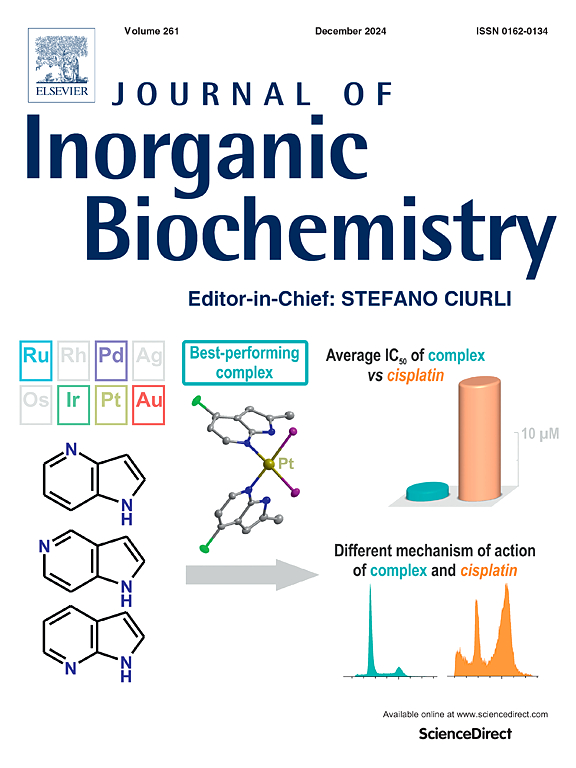Molecular basis of H2O2/O2.−/.OH discrimination during electrochemical activation of DyP peroxidases: The critical role of the distal residues
IF 3.8
2区 化学
Q2 BIOCHEMISTRY & MOLECULAR BIOLOGY
引用次数: 0
Abstract
Here, we show that the replacement of the distal residues Asp and/or Arg of the DyP peroxidases from Bacillus subtilis and Pseudomonas putida results in functional enzymes, albeit with spectroscopically perturbed active sites. All the enzymes can be activated either by the addition of exogenous H2O2 or by in situ electrochemical generation of the reactive oxygen species (ROS) •OH, O2•- and H2O2. The latter method leads to broader and upshifted pH-activity profiles. Both WT enzymes exhibit a differential predominance of ROS involved in their electrochemical activation, which follows the order •OH > O2•- > H2O2 for BsDyP and O2•- > H2O2 > •OH for PpDyP. This ROS selectivity is preserved in mutants with unperturbed sites but is blurred out for distorted sites. The underlying molecular basis of the selectivity mechanisms is analysed through molecular dynamics simulations, which reveal distorted hydrogen bonding networks and higher throughput of the access tunnels in the variants exhibiting no selectivity. The electrochemical activation method provides superior performance for protein variants with a high prevalence of the alternative •OH and O2•- species. These results constitute a promising advance towards engineering DyPs for electrocatalytic applications.

H2O2/O2.-/的分子基础。在DyP过氧化物酶的电化学活化过程中的OH辨别:远端残基的关键作用。
在这里,我们证明了从枯草芽孢杆菌和恶臭假单胞菌中替换DyP过氧化物酶的远端残基Asp和/或Arg会产生功能性酶,尽管具有光谱扰动的活性位点。所有的酶都可以通过添加外源H2O2或通过原位电化学生成活性氧(ROS)•OH、O2•-和H2O2来激活。后一种方法可以得到更宽的ph -活度曲线。两种WT酶在其电化学激活过程中都表现出不同的ROS优势,其顺序为:•OH > O2•- > H2O2 (BsDyP)和O2•- > H2O2 >•OH (PpDyP)。这种ROS选择性在具有未受干扰位点的突变体中保留,但对于扭曲位点则模糊了。通过分子动力学模拟分析了选择性机制的分子基础,揭示了无选择性的变体中氢键网络的扭曲和通道的高通量。电化学活化方法对具有高选择性•OH和O2•-的蛋白质变体提供了优越的性能。这些结果构成了电催化应用的工程DyPs的有希望的进展。
本文章由计算机程序翻译,如有差异,请以英文原文为准。
求助全文
约1分钟内获得全文
求助全文
来源期刊

Journal of Inorganic Biochemistry
生物-生化与分子生物学
CiteScore
7.00
自引率
10.30%
发文量
336
审稿时长
41 days
期刊介绍:
The Journal of Inorganic Biochemistry is an established international forum for research in all aspects of Biological Inorganic Chemistry. Original papers of a high scientific level are published in the form of Articles (full length papers), Short Communications, Focused Reviews and Bioinorganic Methods. Topics include: the chemistry, structure and function of metalloenzymes; the interaction of inorganic ions and molecules with proteins and nucleic acids; the synthesis and properties of coordination complexes of biological interest including both structural and functional model systems; the function of metal- containing systems in the regulation of gene expression; the role of metals in medicine; the application of spectroscopic methods to determine the structure of metallobiomolecules; the preparation and characterization of metal-based biomaterials; and related systems. The emphasis of the Journal is on the structure and mechanism of action of metallobiomolecules.
 求助内容:
求助内容: 应助结果提醒方式:
应助结果提醒方式:


